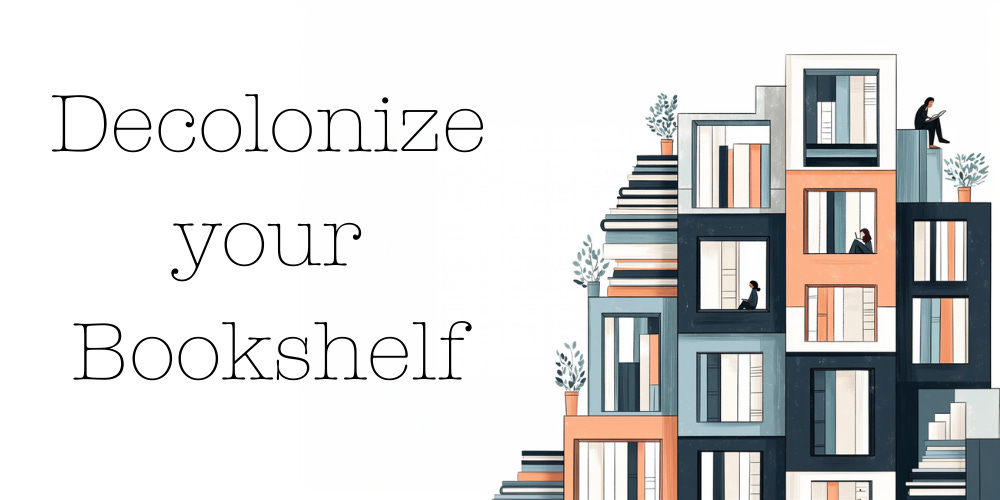5 Surprising Books to Decolonize your Bookshelf for Fall
From grief to growth: discover stories perfect for chilly nights
Asian Writers’ Collective is a publication dedicated to fostering greater understanding and appreciation of Asian cultures and experiences among a global readership. Subscribe to decolonize your reading and discover unique writing.
Ah autumn—time for chunky sweaters, tea, and piles of blankets. We can throw off the sweltering heat of summer and finally get ready for prime snuggle weather. Anyone else a fall/winter lover?
For the readers among us, I’m happy to present my list of personal recommendations by Asian authors. Some who are subscribed to my main newsletter, Notes from the Town Hermit, may recognise a few of these titles, but I can never mention my favourites often enough. Sorry, not sorry.
Happy sweater weather reading!
Fiction
Linghun by Ai Jiang (2023) is a novella about a town called HOME where grief manifests dead loved ones as ghosts. Wenqi's parents move there to reunite with her deceased brother, forgetting her, their still-living child, in the process. The story explores themes of grief, family dynamics, and Chinese cultural values. It portrays grief as a state that can trap people, alienating them from the living and preventing them from moving forward. But as the book challenges, grief is not a place to live. One of the ironic things is that though the town is called HOME, residents never seem truly at home, but rather in a sort of purgatory where time has stopped. Click here to read Ai Jiang’s interview.
To Live by Yu Hua (1993) is a historical fiction novel that tells the story of one man and his family and how to face suffering with peacefulness. After gambling away all his wealth, Fugui ends up a peasant with his wife and two children. Through the Chinese Civil War, Great Famine, and Cultural Revolution, this book is one that zooms in on the mundane suffering of ordinary people. It begs the question, when great men make wars and decisions, why is it always the poorest and most invisible who suffer the most? While Fugui is not an impressive character, he faces tremendous hardship with tranquillity and will to survive. He has lived an obscure life that will be forgotten. This book challenges the notion that we must strive for greatness in order to be great; in truth, living a quiet life with dignity is just as admirable, if not more so.
The Border of Paradise by (2016) gripped me and didn’t let go for weeks. A disturbing, claustrophobic gothic novel about David and Daisy Novak, and David’s childhood sweetheart, Marianne. The decisions of these three adults ripple through to the next generation with devastating consequences. Told through multiple perspectives of each member of the Novak family, the story begins with a wide world—spanning New York and Taiwan—then shrinks to an isolated house in rural California. It’s multi-layered and poignant, and the feeling of un-belonging and alienation reverberated through me as Esmé described that aspect of mental illness with deft clarity. This book is not for the faint of heart. It crept under my skin and left me disturbed, long after I finished reading it. Esmé’s interview will be dropping in October, so make sure you’re subscribed to hear from her!
Nonfiction
Where I Belong: Healing Trauma and Embracing Asian American Identity by Soo Jin Lee and Linda Yoon (2024) is an incredible resource for anyone of the Asia diaspora. Soo Jin and Linda are two licensed therapists who wrote this book to address the deeply rooted intergenerational trauma immigrant children experience. Each chapter focuses on one aspect, shares diverse stories of Asian Americans and their families through their own words, and ends with a therapeutic exercise. This book is one that validates the Asian immigrant experience and gives tools for healing. Click here to read Linda’s interview.
Sorry I’m Late, I Didn’t Want to Come by (2019) was so relatable for super-introverted me. Jessica chronicles her year of living like an extrovert for one year, to hilarious misadventures and heartwarming life lessons. Imagining myself doing any of the things she did make me want to die (doing stand-up comedy, going on a live show, talking to strangers, improv… shudder). She doesn’t suggest that introverts have to change themselves. Rather, she gives insight into what happens when we step out of our comfort zones once in awhile, the surprising connections we can make. Jess’s writing is sweet, personable, and made me laugh out loud at so many points. It’s a nice balance to the heavier reads on this list.
Have you read any of these titles or do you plan to? What did you think?
Share some of your own book recommendations by Asian authors in the comments!
I want to give a whole-hearted thank you to
, Lael Johnson, , , , , , , for upgrading to paid! Everything here will always be free to read and access, but your sponsorship supports the work that goes into organizing and creating this publication. My great hope is to be able to pay our guest writers in the future. It’s only $15/year to sponsor this publication, so if our mission resonates with you, please consider upgrading.






When the Emperor was Divine by Julie Otsuka and Goodbye, Vitamin by Rachel Khong are faves. Also Pachinko by Min Jin Lee! Oh and for essays, try Western Journeys by Teow Lim Goh.
I haven’t read any of these yet! Thanks for the recommendations! Earlier this year, I picked up “Before the Coffee Gets Cold” by Toshikazu Kawaguchi, and it was amazing Really tugged at my heartstrings.